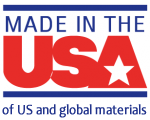Universal accessibility, which ensures that people with disabilities can freely and comfortably navigate a space, is an important objective for businesses and other public facilities. ADA compliant aluminum ramps are an affordable and flexible option.
Aluminum ramps are essential for people with restricted mobility because they provide safe access to elevated or hard-to-reach areas. Aside from wheelchair users it’s important to also consider people who need crutches, canes and walkers, and people who don’t walk with a regular gait. With durable and lightweight access solutions from REDD Team, you can improve safety in a wide range of environments.
REDD Team is a leading American manufacturer of code-compliant aluminum access products, including the Universal Wheelchair Ramp System along with its counterpart, the Universal Stair. The system is ADA compliant and also meets the requirements of other codes, such as IBC, SBC, BOCA, SREF, UBC and LIFE SAFETY 101.
Congress created the Americans with Disabilities Act of 1991 to dictate how ramps are designed for public places in order to ensure safe access. The law includes offices, schools, churches, restaurants, retail stores, apartment buildings, and a wide range of other businesses and structures.

ADA Guidelines for Safe Ramps
We have summarized the ADA requirements below, but recommend that you consult your local building inspector for more ADA code compliance information.
- Wheelchair ramps must be a minimum of 36 inches wide; however, Massachusetts and California ADA codes now require 48 inches of ramp width.
- ADA ramps should not exceed a 1:12 slope ratio. Every inch of rise needs 12 inches of ramp. For example, a 30-inch rise requires a 30-foot ramp.
- There must be a flat, unobstructed area at the top and bottom of the ramp which is a minimum of 5-feet x 5-feet.
- Ramps exceeding 30 feet must have an intermediate platform.
- Handrails that are between 34 inches and 38 inches in height are required on both sides of all ramps that rise steeper than 6 inches or have a horizontal projection of more than 72 inches.
- ADA ramps must have edge protection to prevent accidental slipping.
- The surfaces of ADA ramps and platforms must be slip-resistant and designed to prevent accumulation of water.
ADA Ramp Materials
Compliant ramps can be constructed of concrete, wood, steel or aluminum. What are the advantages and disadvantages of each?
Concrete is stable and durable. The surface can be brushed to incorporate slip-resistant properties. However, concrete is expensive and, once built, is virtually impossible to modify as your needs change.
Wood is one of the least expensive materials, but may rot, splinter or warp if not protected with sealer or varnish (handrails included) and stored properly. Wood joints can become loose or wobbly. Also, care must be taken when spacing the boards. They must be placed close enough together to avoid bumps, but far enough apart to allow good water drainage.
Steel has the same weight-to-strength ratio of wood and aluminum, but is three times heavier than aluminum, making ramps difficult to transport and handle. Steel also must be galvanized to prevent rust and corrosion, and a texture must be added to the surface to help prevent slipping. It also requires repainting every few years.
Aluminum is strong, rust-resistant, lightweight, eco-friendly, and will not warp, rot, or splinter. Unlike wood, which will shrink and expand, an aluminum access system will maintain its shape in spite of extreme cold or heat. Since it can be extruded, aluminum can be formed into almost any imaginable shape. These qualities make it ideal for ramps, platforms, stairs, bridges and similar structures.
If you are looking for high-quality ADA compliant ramps and platforms, or aluminum stairs and other products, to provide secure access, REDD Team has the ideal solution. Our aluminum systems are cost-effective, configured to meet your building code regulations, and are designed for simple and painless installation. Call us today at (800) 648-3696 to learn more.

